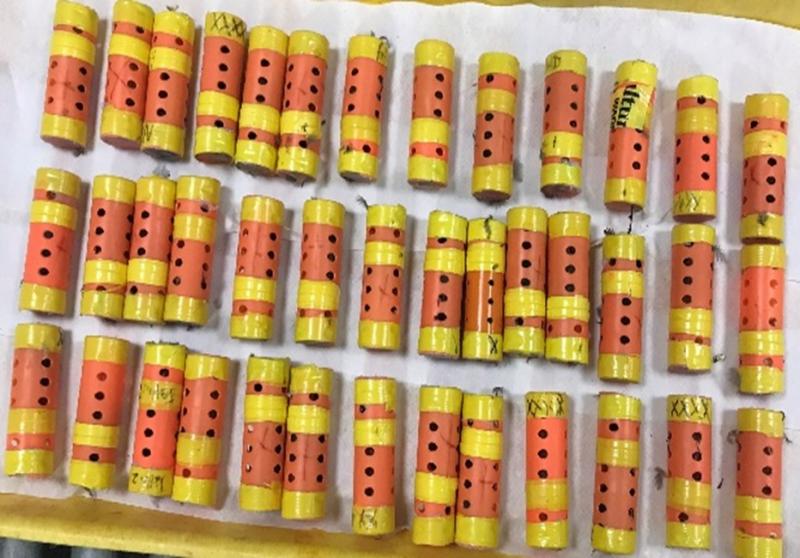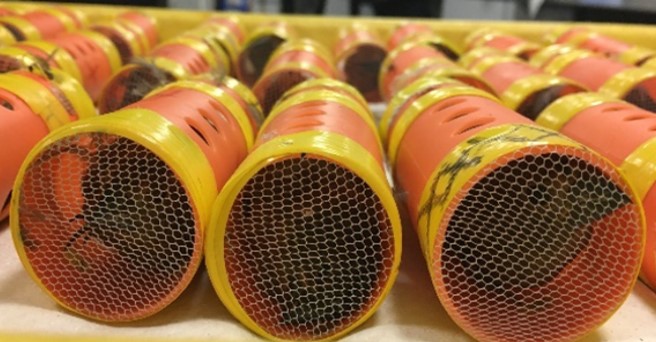JAMAICA, N.Y. – It was like “deja-vu all over again” as CBP agriculture specialists discovered 40 finches concealed in hair rollers inside a Guyana man’s baggage at John F. Kennedy International Airport on Saturday.

by CBP Agricultural Specialist at JFK Airport.
CBP officers discovered the finches during a secondary baggage examination after the 36-year-old man arrived on a flight from Georgetown, Guyana. CBP agriculture specialists consulted with U.S. Fish and Wildlife Service inspectors who directed CBP to seize the finches.
The man, who was destined to an address in New York City, was not criminally charged; however, CBP assessed a $300 civil penalty, the deemed the man inadmissible into the United States, and placed him on a Guyana-bound flight later that same day.
CBP agriculture specialists quarantined the finches and turned them over to United States Department of Agriculture Veterinary Services.

“CBP Agriculture Specialists are the first line of defense to prevent the introduction of animal diseases that have the potential to cause significant damage to the Nation’s agricultural economy,” said Marty C. Raybon, Acting Director of Field Operations for CBP’s New York Field Office.
“The Service works with other federal agencies to provide a whole-of-government approach at our borders,” said Edward Grace, Assistant Director for the U.S. Fish and Wildlife Service Office of Law Enforcement. “Working together with agencies such as the U.S. Customs and Border Protection and the U.S. Department of Agriculture, we strive to protect Americans from the potential spread of zoonotic disease, and world wildlife resources from the impacts of trafficking."
The public is encouraged to Report Wildlife Crime tips to U.S. Fish and Wildlife Service to FWS_TIPS@fws.gov or at 1-844-FWS-TIPS (397-8477).
The U.S. Department of Agriculture Animal and Plant Health Inspection Service describes the lawful process for importing birds for commercial purposes. Improperly imported birds pose the potential threat of introducing Highly Pathogenic Avian Influenza (HPAI), also known as bird flu, to the United States poultry industry.
The U.S. poultry industry suffered severe impacts during a 2015 HPAI outbreak. According to the USDA Economic Research Service, more than 50 million commercial turkeys and laying hens in the U.S. died or were culled to stop the spread of the disease. The losses were estimated at more than $1 billion, and the economic impact much greater as more than 50 poultry trading partners imposed partial to full bans on U.S. poultry imports. The U.S. poultry industry has since recovered.
CBP agriculture specialists have extensive training and experience in the biological sciences and agricultural inspection. They examine international trade shipments and traveler baggage every day in the search for invasive insects, federal noxious weeds, and plant and animal diseases that could have a serious impact on our national agricultural resources.
During a typical day last year, CBP agriculture specialists across the nation seized 3,091 prohibited plant, meat, animal byproducts, and soil, and intercepted 250 insect pests at U.S. ports of entry. See what else CBP achieved on a typical day during 2020.
Visit CBP Ports of Entry to learn more about how CBP’s Office of Field Operations secures our nation’s borders. Learn more about CBP at www.CBP.gov.


